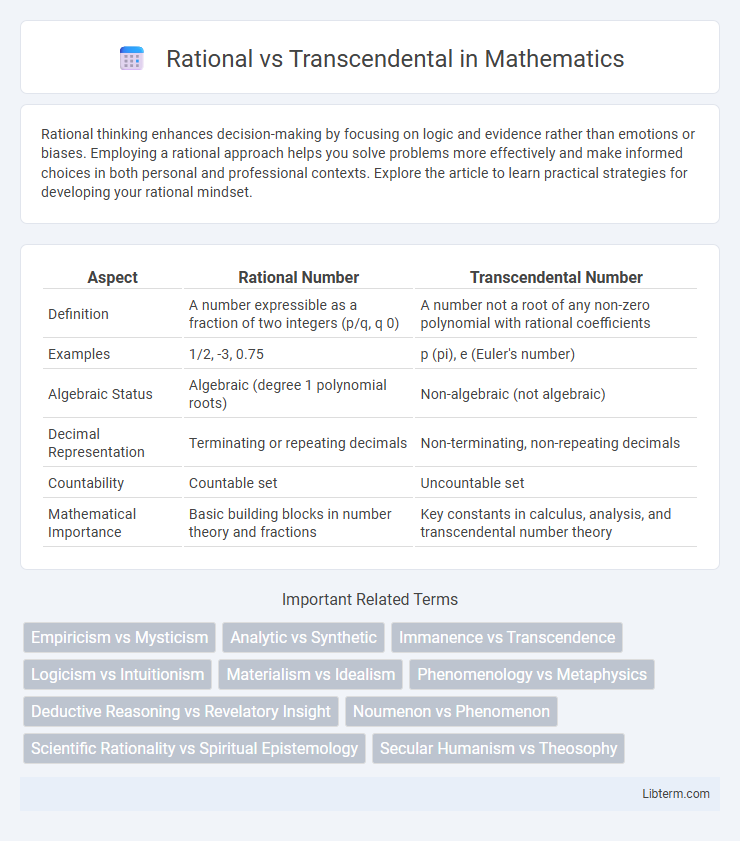Rational thinking enhances decision-making by focusing on logic and evidence rather than emotions or biases. Employing a rational approach helps you solve problems more effectively and make informed choices in both personal and professional contexts. Explore the article to learn practical strategies for developing your rational mindset.
Table of Comparison
| Aspect | Rational Number | Transcendental Number |
|---|---|---|
| Definition | A number expressible as a fraction of two integers (p/q, q 0) | A number not a root of any non-zero polynomial with rational coefficients |
| Examples | 1/2, -3, 0.75 | p (pi), e (Euler's number) |
| Algebraic Status | Algebraic (degree 1 polynomial roots) | Non-algebraic (not algebraic) |
| Decimal Representation | Terminating or repeating decimals | Non-terminating, non-repeating decimals |
| Countability | Countable set | Uncountable set |
| Mathematical Importance | Basic building blocks in number theory and fractions | Key constants in calculus, analysis, and transcendental number theory |
Introduction to Rational and Transcendental Thinking
Rational thinking involves analyzing information through logic, evidence, and systematic reasoning, emphasizing objective evaluation and clear problem-solving steps. Transcendental thinking goes beyond empirical experience, exploring fundamental principles and a priori knowledge that underlie human understanding and cognition. This distinction highlights how rational thought relies on observable data, while transcendental thought investigates the essential conditions that make knowledge possible.
Defining Rational Thought
Rational thought is defined as the process of reasoning based on logic, evidence, and systematic analysis, emphasizing clear, structured, and objective decision-making. It involves utilizing deductive and inductive reasoning to solve problems, assess hypotheses, and draw conclusions grounded in empirical data. This contrasts with transcendental thinking, which seeks understanding through intuition, metaphysical concepts, or beliefs beyond empirical observation.
Exploring Transcendental Philosophy
Transcendental philosophy investigates the conditions of possibility for knowledge, emphasizing a priori concepts that structure human experience, distinct from rational philosophy's reliance on empirical reasoning and logic. Immanuel Kant's Critique of Pure Reason lays the foundation of transcendental idealism, asserting that space, time, and categories of understanding shape perception before empirical input occurs. This approach explores how the mind actively constructs reality, offering a framework that transcends mere sensory data to reveal the underlying principles enabling cognition.
Historical Roots and Key Figures
Rationalism traces back to Ancient Greece with philosophers like Plato emphasizing reason as the primary source of knowledge, while Enlightenment figures such as Rene Descartes further developed its principles through systematic doubt and innate ideas. Transcendental philosophy emerged in the late 18th and early 19th centuries, led by Immanuel Kant, who sought to reconcile rationalism and empiricism by examining the conditions that make knowledge possible. Key figures in transcendentalism also include Johann Gottlieb Fichte and Georg Wilhelm Friedrich Hegel, who expanded on Kant's ideas to explore consciousness and self-awareness beyond empirical experience.
Core Differences: Rational vs Transcendental Approaches
Rational approaches rely on logic, empirical evidence, and structured reasoning to understand phenomena, emphasizing analytical and objective methods. Transcendental approaches focus on intuition, inherent knowledge, and metaphysical insights, prioritizing subjective experience beyond empirical observation. Core differences lie in rationalism's dependence on evidence and analysis versus transcendentalism's reliance on innate perception and abstract principles.
Influence on Modern Philosophy
Rational philosophy emphasizes reason and logical analysis as the primary sources of knowledge, shaping modern epistemology and scientific inquiry through figures like Descartes and Leibniz. Transcendental philosophy, pioneered by Kant, investigates the conditions of possibility for experience and knowledge, profoundly influencing contemporary metaphysics and phenomenology. The dynamic interplay between rational and transcendental approaches has driven critical developments in understanding consciousness, reality, and the limits of human cognition.
Practical Applications in Daily Life
Rational thinking emphasizes logic and structured problem-solving, making it essential for practical tasks like budgeting, planning, and decision-making in daily life. Transcendental approaches encourage intuition and reflection, aiding mindfulness practices, creative problem-solving, and personal growth. Combining both methods enhances adaptability and effective responses to real-world challenges.
Strengths and Limitations of Rationalism
Rationalism excels in providing clear, logical frameworks and emphasizes knowledge derived from reason and innate ideas, offering strong foundations in mathematics and philosophy. Its limitations include difficulty in accounting for empirical evidence and sensory experience, which can lead to abstract or disconnected conclusions from real-world phenomena. This reliance on a priori knowledge sometimes restricts adaptability to new information gained through observation and experimentation.
Advantages and Challenges of Transcendentalism
Transcendentalism offers the advantage of promoting individual intuition and spiritual insight beyond empirical evidence, fostering creativity and deep personal growth. It challenges rigid rational frameworks by encouraging a connection with nature and the inherent goodness of people, which enhances emotional resilience and moral awareness. However, its reliance on subjective experience can lead to difficulties in objective validation and practical application in scientific and logical discourse.
Conclusion: Integrating Rational and Transcendental Perspectives
Integrating rational and transcendental perspectives enriches understanding by combining empirical analysis with intuitive insight, fostering a more comprehensive worldview. Rational approaches prioritize logic and evidence, while transcendental views emphasize experience and inherent meaning, each addressing different dimensions of knowledge. The synthesis of both frameworks promotes balanced reasoning and deeper cognitive awareness, enhancing problem-solving and philosophical inquiry.
Rational Infographic

 libterm.com
libterm.com